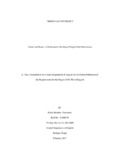Please use this identifier to cite or link to this item:
https://elibrary.tucl.edu.np/handle/123456789/3008| Title: | Rituals and Power: A Performative Reading of Nepali Dalit Movements |
| Authors: | Charmakar, Rudra Bahadur |
| Keywords: | Power;Readings;Movement |
| Issue Date: | 2017 |
| Publisher: | Central Department of English |
| Abstract: | This thesis analyses how Dalit Movements in Nepal have used rituals as part of their strategies and how ritual practices make impacts in the movements. As, Nepali society is based on four fold varna system- Brahman, Kshetri, Bhaishya, and Shudra; which has been practicing from 3500 years ago. In course of time, State enacted the legislations, rules and regulations on the basis of misinterpretations of Vedas, Puranas, and Hindu religious books and imposed discriminatory social hierarchy in the society. According to varna system, Shudras are supposed to have come at the bottom of the hierarchy; and, they have to bear the discrimination, suppression, oppression, boycott, exclusion, hatred, and negligence from the society. They have been discriminated more in ritual and cultural sectors. Consequently, Dalit movements from the inception adopted the cultural and ritual practices as methods such as chanting the mantras and richas, from religious books; reciting the mandal, and suktas from Vedas and Puranas; performing the ritual and cultural activities in the temples and sacred places; placing the tulsi-moth and temple nearby homes etc. The movements raised the issues for equality, dignity and social liberation in 1940s; however, it got a new height after 1990. It is believed that the ritual and cultural practices have power to overcome the problems. So, Dalit also thought that they have received the power and inspiration from Gods and Goddesses by performing ritual and religious activities. After the political changes of 1990, Dalit movements have amended some agenda and demands; and changed the procedures as well. As a result, they gained some historical achievements within few decades. Hence, by looking at the scenario of Dalit movements from ritual and performative perspectives; there is power, enthusiasm and inspiration in ritual practices which give success, happiness and satisfaction to the performers. |
| URI: | http://elibrary.tucl.edu.np/handle/123456789/3008 |
| Appears in Collections: | English |
Files in This Item:
| File | Description | Size | Format | |
|---|---|---|---|---|
| Thesis.pdf | 2.62 MB | Adobe PDF |  View/Open |
Items in DSpace are protected by copyright, with all rights reserved, unless otherwise indicated.
